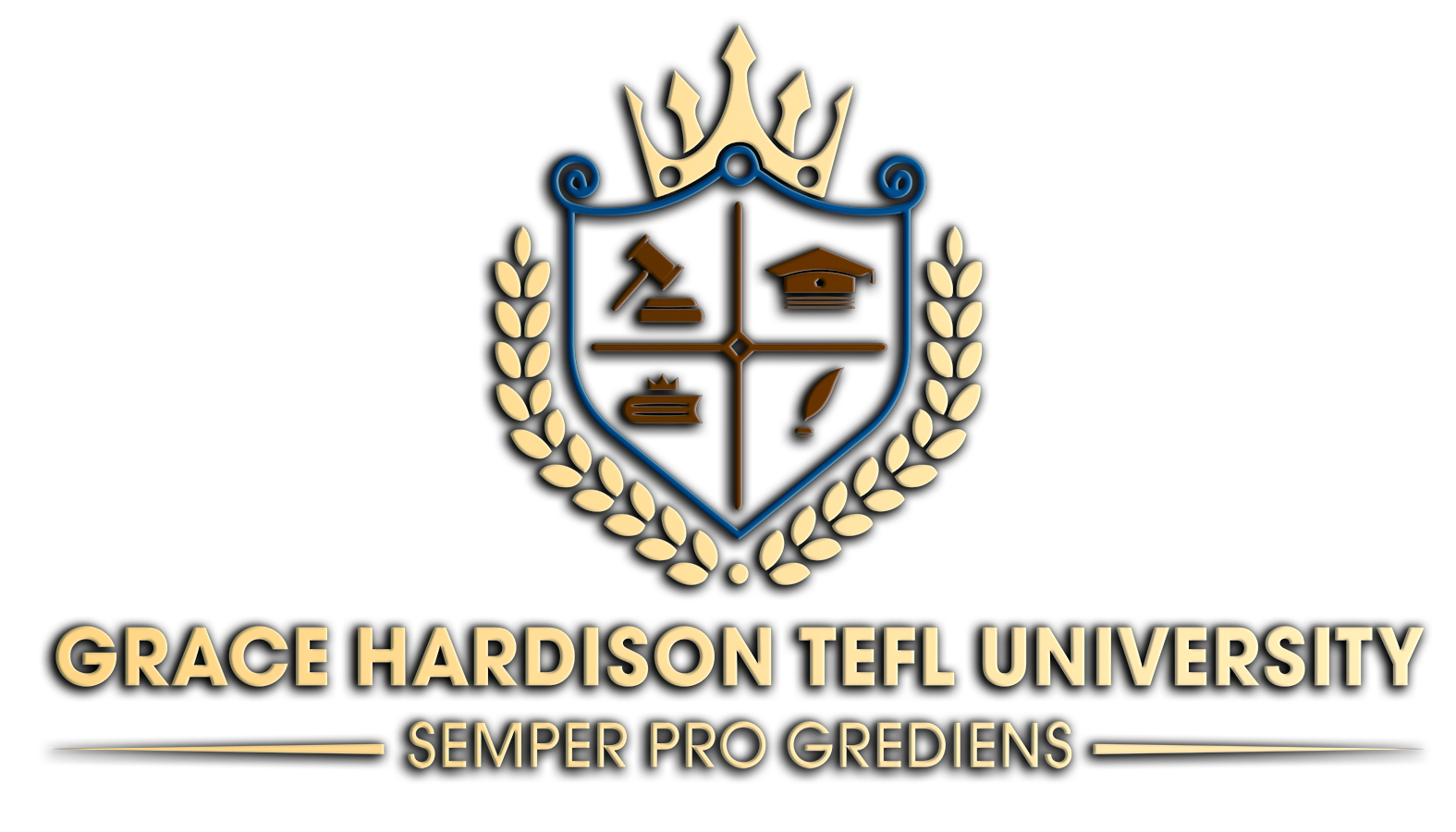DQP
Categories of learning
[Guided by the International Degree Qualifications Profile (DQP)]
Guiding Ideology for International Compliance standards
Most important to Grace Hardison TEFL University is one’s understanding of a continuum of knowledge and skills, leading from acquaintance with a field of study (TEFL) to summative mastery and expertise appropriate to a degree awarded.
Moreover, while the university anticipates that students will generally demonstrate proficiency by completing courses or other program requirements, the university also emphasizes the importance of students’ frequent and progressively more challenging work on assignments and projects across our courses or learning experiences to develop the expected proficiencies.
Our Guiding Principles from the DQP
3 key areas of proficiency

Specialized Knowledge

Intellectual
Skills

Applied and Collaborative Learning
Combining all three elements yields something like the following: Compare the substance of [argument X] with [argument Y] through a written essay [of Z length] that cites at least three examples of essential ways in which the arguments differ.” This basic approach can be used to construct assignments in virtually any field of study that combines one or more DQP proficiencies with explicit content knowledge.
Implementation of this approach at scale has necessitated our university to aspire to the required compliance standards.
Note: Specific and key elements of the DQP guidelines are outlined in the following summation for relevance to the ESL/EFL TEFL field of study.
Specialized Knowledge
This category addresses what students in each specialization should demonstrate concerning the specialization beyond the vocabularies, theories, and skills of particular fields of study and should demonstrate to earn the certification/degree..
| BA Degree TEFL,
the student |
Master’s Degree TEFL,
the student |
| Defines and explains the structure, styles and practices of the field of study using its tools, technologies, methods and specialized terms.
Investigates a familiar but complex problem in the field of study by assembling, arranging and reformulating ideas, concepts, designs and techniques. Draws on current research, scholarship and techniques in the field of study. |
Elucidates the major theories, research methods and approaches to inquiry and schools of practice in the field of study, articulates their sources and illustrates both their applications and their relationships to allied fields of study.
Articulates significant challenges involved in practicing the field of study, elucidates its leading edges and explores the current limits of theory, knowledge and practice through a project that lies outside conventional boundaries |
Intellectual Skills
This category includes traditional and nontraditional cognitive skills: analytic inquiry, use of information resources, engaging diverse perspectives, ethical reasoning, quantitative fluency, and communicative fluency.
| BA Degree TEFL,
the student |
Master’s Degree TEFL,
the student |
| Locates, evaluates, incorporates and properly cites multiple information resources in different media in projects, papers or performances.
Generates information through independent or collaborative inquiry and uses that information in a project, paper or performance. Conducts an inquiry concerning information, conditions, technologies or practices in the field of study that makes substantive use of language sources |
Disaggregates, reformulates and adapts principal ideas, techniques or methods at the forefront of the field of study in carrying out an essay or project.
Investigates through a project, paper or performance a core issue in the field of study from the perspective of a different point in time or a different culture, language order or technological context and explains how this perspective yields results that depart from current norms, dominant cultural assumptions or technologies. Articulates and challenges a tradition, assumption or prevailing practice within the field of study by raising and examining relevant ethical perspectives through a project, paper or performance. |
Applied and Collaborative Learning
This category emphasizes what students can do with what they know. Students are asked to demonstrate their learning by addressing unscripted problems in scholarly inquiry, work, and other settings outside the classroom.
This category includes research and creative activities involving both individual and group effort and may include practical skills crucial to the application of expertise.
| BA Degree TEFL,
the student |
Master’s Degree TEFL,
the student |
| Completes a substantial project that evaluates a significant question in the student’s field of study, including an analytic narrative of the effects of learning outside the classroom on the research or practical skills employed in executing the project. | Creates a project, paper, exhibit, performance or other appropriate demonstration reflecting the integration of knowledge acquired in practicum, work, community or research activities with knowledge and skills gleaned from at least two fields of study in different segments of the curriculum.
Articulates the ways in which the two sources of knowledge influenced the result. Designs and implements a project or performance in an out-of-class setting that requires the application of advanced knowledge gained in the field of study to a practical challenge, articulates in writing or another medium the insights gained from this experience, and assesses (with appropriate citations) approaches, scholarly debates or standards for professional performance applicable to the challenge. |
